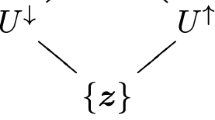Abstract
Measurement is a process aimed at acquiring and codifying information about properties of empirical entities. In this paper we provide an interpretation of such a process comparing it with what is nowadays considered the standard measurement theory, i.e., representational theory of measurement. It is maintained here that this theory has its own merits but it is incomplete and too abstract, its main weakness being the scant attention reserved to the empirical side of measurement, i.e., to measurement systems and to the ways in which the interactions of such systems with the entities under measurement provide a structure to an empirical domain. In particular it is claimed that (1) it is on the ground of the interaction with a measurement system that a partition can be induced on the domain of entities under measurement and that relations among such entities can be established, and that (2) it is the usage of measurement systems that guarantees a degree of objectivity and intersubjectivity to measurement results. As modeled in this paper, measurement systems link the abstract theory of measuring, as developed in representational terms, and the practice of measuring, as coded in standard documents such as the International Vocabulary of Metrology.
Similar content being viewed by others
References
Birkhoff, G. (1948). Lattice theory (American Mathematical Society colloquium series, Vol. 25).
Bridgman P. (1927) The logic of modern physics. Macmillan, New York
Carnap R. (1966) Philosophical foundations of physics. Basic Books, Inc., New York–London
Finkelstein L. (2003) Widely, strongly and weakly defined measurement. Measurement 34: 39–48. doi:10.1016/S0263-2241(03)00018-6
Finkelstein L. (2005) Problems of measurement in soft systems. Measurement 38: 267–274. doi:10.1016/j.measurement.2005.09.002
Hempel C.G. (1952) Fundamentals in concepts formation in physical sciences. University of Chicago Press, Chicago
Hempel C.G. (1965) Aspects of scientific explanation and other essays in the philosophy of science. Free Press, Glencoe
JCGM. (2008a). JCGM 200:2008, International vocabulary of metrology—basic and general concepts and associated terms (VIM, 3rd ed.). Downloadable from http://www.bipm.org.
JCGM. (2008b). JCGM 100:2008, Evaluation of measurement data—guide to the expression of uncertainty in measurement (GUM, 1995 with minor corrections). Downloadable from http://www.bipm.org.
Krantz D.H., Luce R.D., Suppes P., Tversky A. (1971) Foundations of measurement (Vol. I). Academic Press, New York
Kuhn T.S. (1961) The function of measurement in modern physical sciences. Isis 52: 161–193. doi:10.1086/349468
IEC. (2008). IEC 60050 series, and Electropedia (also known as the “International Electrotechnical Vocabulary (IEV) Online”). Retrieved from http://www.electropedia.org.
Luce, R. D. Krantz. D. H., Suppes, P. & Tversky, A. (1990). Foundations of measurement (Vol. III). San Diego: Academic Press
Mari L. (2003) Epistemology of measurement. Measurement 34: 17–30. doi:10.1016/S0263-2241(03)00016-2
Mari, L. (2007). Measurability. In M. Boumans (Ed.), Measurement in economics (pp. 41-77). Amsterdam, Elsevier.
Narens L. (1985) Abstract measurement theory. Mass MIT Press, Cambridge
Narens L. (2002) Theories of meaningfulness. Mahwah, NJ, Lawrence Erlbaum Associates
Niederée R. (1992) What do numbers measure? A new approach to fundamental measurement. Mathematical Social Sciences 24: 237–276. doi:10.1016/0165-4896(92)90063-B
Pfanzagl, J. (1968). Theory of measurement (2nd ed.). New York: Wiley (Vienna: Physica, 1971).
Roberts J. (1979) Measurement theory. Addison-Wesley, Reading, Mass
Scott D., Suppes P. (1958) Foundational aspects of theories of measurement. Journal of Symbolic Logic 23: 13–128. doi:10.2307/2964453
Stevens S. (1946) On the theory of scales of measurement. Science 103: 677–680. doi:10.1126/science.103.2684.677
Suppes P. (2006) Transitive indistinguishability and approximate measurement with standard finite ratio-scale representations. Journal of Mathematical Psychology 50: 329–336
Suppes P., Krantz D.H., Luce R.D., Tversky A. (1990) Foundations of measurement (Vol. II). Academic Press, New York
Suppes, P., & Zinnes, J. L. (1963). Basic measurement theory. In R. D. Luce, R. R. Bush, & E. Galanter (Eds.). Handbook of mathematical psychology (Vol. 1, pp. 1–76). New York, Wiley.
Author information
Authors and Affiliations
Corresponding author
Rights and permissions
About this article
Cite this article
Frigerio, A., Giordani, A. & Mari, L. Outline of a general model of measurement. Synthese 175, 123–149 (2010). https://doi.org/10.1007/s11229-009-9466-3
Received:
Accepted:
Published:
Issue Date:
DOI: https://doi.org/10.1007/s11229-009-9466-3




